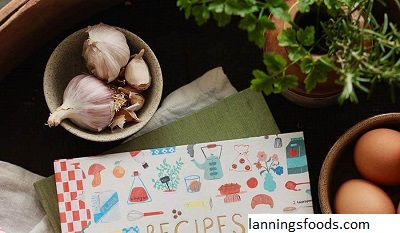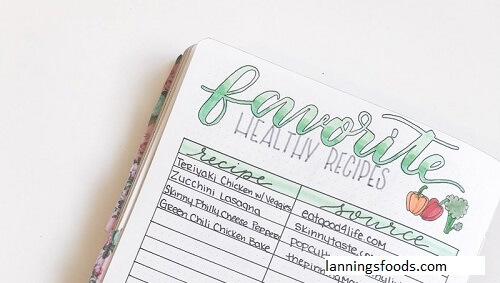The Recipe Journal: A Culinary Companion for Every Home Cook
Cooking is more than a necessity; it is an art, a passion, and a way to express creativity. For many, the kitchen becomes a sanctuary where flavors meld, aromas waft, and meals come to life. As you begin your culinary adventure, having a recipe journal will add flavor to your journey: you will be able to record, create, and reflect on your adventures in the kitchen. This paper will explain the definition of a journal, its advantages, some guidelines to maintain one and answer some of the most often asked questions.

What is a Recipe Journal?
It is a diary of all your cooking adventures personally. Record your favorite, changes, and other observations about the different dishes. You can do it on paper using a notebook, or using a computer document, or an application on a mobile phone to record your favorite recipes. The most basic reason why one keeps a journal is to produce one’s very own cookbook which symbolizes one’s journey through cooking.
Benefits of Recipe Journal:
- Organization: All your favorite dishes will be in one place to help easily pick an inspiration in case you cannot figure out what to prepare.
- Customization: You might alter and adapt based on the taste or need, including other ingredients, in a way that could best serve you. Record those changes so you have the chance to produce perfect versions next time.
- Learning Resource: Every time you try something new, from technique and ingredients to cuisines, a journal will be your growth chart so that you can track what works and does not work in order to improve in an ongoing way.
- Memories linked to cooking: Cooking can be said to be accompanied by memories, like family gatherings, holidays, or special occasions. Your journal can be an essential memory treasure that connects you to the past and those people who shared those meals with you.
- Creativity and Inspiration: Recording your culinary adventure may inspire new ideas about what you want to prepare for future cooking endeavors. At times, you find the perfect combination of various elements from different to produce something unique.
How to Start Your Recipe Book:
It is pretty easy to create a journal that can fit whatever style or need you want. Here’s how you start.
1. Determine Your Medium:
Do you prefer paper and ink from a book or have you been filing your ideas with an electronic file or utilizing an application? Well, here’s the upside to using any of these types of media:
- Paper and book: Tactile, and it is the personal aspect. Let’s doodle, draw, or clip something inside.
- Digital Document: It can be sorted easily and accessed. It is accessible by various devices, which can automatically back up your data.
- Recipe Apps: Most apps enable users to save, categorize, and share. The features of most apps offer meal planning and shopping lists.
2. Create Sections or Categories:
You may want to make your journal easy to flip through. It can also make divisions in the course of meals, cuisine, or methods of cooking. You can also provide wine pairing suggestions, time taken for preparation, and how to serve.

3. Recording the Basics:
For every recipe, you should put in the following:
- Recipe name
- List of ingredients
- Instructions
- Preparation time and quantity to serve
- Personal comments or variations
4. Add Personal Touches:
Make your journal personal by doing the following:
- Write memories you have about each.
- Add photographs of the finished dish.
- Rating of the recipe, or who enjoyed it the most
5. Review and Reflect:
Review your journal at regular intervals. Contemplate what you have learned and which became favorites versus experiments that did not exactly turn out as planned. You can then focus on your preferred dishes and improve on skills over time.
Tips on Keeping Your Journal:
- Be Consistent: Try to record your experiences while cooking regularly. Whether you record after every meal or at the end of each week, consistency will only help you build a fuller collection.
- Do Not Overthink It: Your journal is not a product. What you need to do here is to capture your experiences as much as possible.
- Experiment: Don’t be afraid of trying new methods on you. Your journal serves as a good place in which to write about some of the experiments you attempted in the kitchen, where things may not have happened as well as you think they could have.
- Sharing with others: Share with family and friends. Sharing your journal becomes a little collaborative project as they then add their favorites and notes.
- It Can Be Fun: To spice it up and make the journal colorful, you might have colorful pens, stickers, or drawings to give it a more interesting form in itself. This makes cooking easier and more joyful while doing it.
FAQs related to Recipe Journals:
1. What do I need to write in my recipe journal?
You can write all that you do related to your cooking experience in a journal. At least any book would include the title of the recipe, ingredients to be used, steps for cooking, and the time taken.
Personal comments, amendments, photographs, and memories that come along with each particular must be added.
2. How do I arrange my journal differently?
You can group your journal according to the course, which is appetizer, main courses, and dessert, or according to the country/ethnicity, Italian, Mexican, Asian, and so on. Or the other way round, according to how it was prepared: baked, grilled, sautéed, or however you like it.
Just pick a system that works best for you.
3. May I make it a digital version of my recipe journal?
Absolutely! Most people like digital formats because it is easy and convenient for organizations. You can do word processing software, spreadsheets, or even specialized management apps where you can search, categorize, and share recipes easily.
4. What if I make a mistake or don’t like a recipe?
Mistakes are very much a part of cooking. So, if you are trying and it is not giving you the kind of result you want to produce, pay attention to what went wrong and how you might handle it next time. Reflection in this step is also important in developing as a cook. I do not hesitate to get rid of or even mark up bad recipes.
Conclusion:

A recipe journal is, therefore, not a collection but a reflection on your journey in cooking creativity, and learning. To be inspired by this as all novice cooks and experienced chefs who need an additional spark to cook memorably and understand their art must be, is a gift. So, go ahead, get your favorite notebook, or open that favorite app and document all of your culinary adventures from today!
The time between the entries in your journal is not specifically critical. Updates can be daily, weekly, or even monthly, depending on the frequency of cooking. What is most important is that you keep it updated whenever you try something new or change an existing recipe.